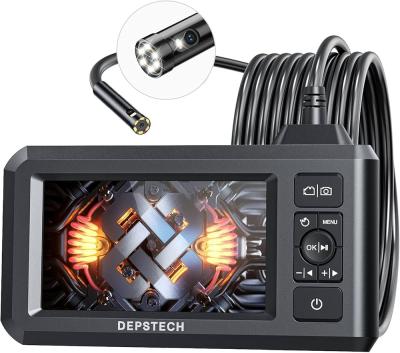Categories
Tags
Archives
Comparative Analysis of Industrial Endoscope Camera Producer
-
Posted by David Lawson Filed in Business #Industrial Endoscope Camera Producer #Industrial endoscope exporter 386 views
In today's fast-paced industrial landscape, the demand for advanced inspection technologies has surged, with industrial endoscope cameras at the forefront. These devices are essential for conducting thorough inspections in hard-to-reach areas, enhancing maintenance efficiency, and ensuring safety standards across various sectors. In this blog, we will delve into the key players in the industrial endoscope market, comparing producers and exporters to help you make informed decisions.
What Are Industrial Endoscope Cameras?
As an Industrial endoscope camera producer we describe the feature of specialized tools used to inspect machinery, pipelines, and other confined spaces. Equipped with high-definition cameras, these devices provide real-time visual feedback, enabling technicians to identify issues without disassembling equipment. Industries such as manufacturing, automotive, aerospace, and construction rely on these cameras for preventive maintenance, quality control, and compliance checks.
Key Features of Industrial Endoscope Cameras
Before diving into the comparative analysis, it's essential to understand the critical features to look for in industrial endoscope cameras:
- Image Quality: Look for cameras with high resolution (1080p or higher) for clear visuals.
- Flexibility: A flexible or articulating probe allows access to tight spaces and complex geometries.
- Lighting: Integrated LED lights enhance visibility in dark environments.
- Durability: Cameras should be robust and resistant to water, dust, and chemicals.
- Connectivity: Wi-Fi or Bluetooth connectivity can simplify data transfer and remote monitoring.
Major Producers of Industrial Endoscope Cameras
1. Olympus Corporation
Overview: A leader in optical and digital technology, Olympus has a long-standing reputation in the endoscope market. They offer a wide range of industrial endoscope cameras that meet rigorous quality standards.
Strengths:
- High image quality and advanced imaging technology.
- Comprehensive support and training for users.
- Established presence in multiple industries.
Weaknesses:
- Higher price point compared to some competitors.
2. Bosch Rexroth
Overview: Known for their automation and control technologies, Bosch Rexroth produces industrial endoscopes designed for robust applications in harsh environments.
Strengths:
- Durable and reliable products.
- Integrated software solutions for data analysis.
- Strong customer service and technical support.
Weaknesses:
- Limited range of models compared to specialized manufacturers.
3. Yateks
Overview: A growing player in the market, Yateks focuses on affordable industrial endoscope cameras without compromising quality. Their products are particularly popular among small and medium enterprises.
Strengths:
- Cost-effective solutions.
- Good range of features for the price.
- Positive customer reviews regarding usability.
Weaknesses:
- Less brand recognition compared to established players.
Major Exporters of Industrial Endoscope Cameras
1. Industrial Video & Control, Inc. (IVC)
Overview: IVC specializes in exporting high-quality industrial endoscope cameras globally. They cater to various industries, ensuring compliance with international standards.
Strengths:
- Wide range of export options tailored to different markets.
- Expertise in meeting regulatory requirements.
- Strong focus on customer service and after-sales support.
Weaknesses:
- Limited product range compared to larger producers.
2. Rothenberger
Overview: Rothenberger is known for its plumbing and pipe inspection tools, including industrial endoscopes. As an Industrial endoscope exporter, they focus on the European market.
Strengths:
- High-quality manufacturing standards.
- Strong distribution network in Europe.
- Comprehensive warranty and service options.
Weaknesses:
- May not offer competitive pricing compared to other exporters.
3. Apec Technologies
Overview: Apec Technologies specializes in exporting a variety of inspection cameras, including endoscopes, to regions like North America and Asia.
Strengths:
- Competitive pricing and diverse product range.
- Custom solutions for different industrial applications.
- Rapid shipping and efficient logistics.
Weaknesses:
- Customer service may vary based on location.
Comparative Analysis: Producers vs. Exporters
When choosing between producers and exporters, several factors come into play:
1. Quality vs. Price
Producers like Olympus and Bosch Rexroth typically focus on quality and innovation, leading to higher prices. In contrast, exporters like Yateks and Apec Technologies often provide cost-effective options, catering to budget-conscious customers.
2. Support and Service
Established producers generally offer extensive support and training, which can be invaluable for companies new to using industrial endoscopes. On the other hand, exporters may focus more on distribution and logistics, sometimes lacking in-depth technical support.
3. Market Reach
Producers usually have a well-established global presence, while exporters might specialize in specific regions. If your business operates in a niche market, an exporter with targeted knowledge of that region may be more beneficial.
4. Innovation
Producers often lead in technological advancements, incorporating the latest imaging technologies and features. Exporters may provide solid options but might not have the same level of innovation as leading producers.
Conclusion
Choosing the right industrial endoscope camera—whether from a producer or exporter—depends on your specific needs, budget, and market focus. Major producers like Olympus and Bosch Rexroth provide high-quality, reliable solutions, while exporters like IVC and Apec Technologies offer competitive pricing and regional expertise.
